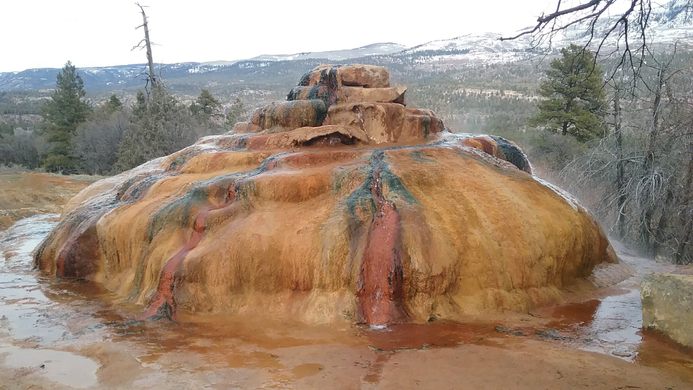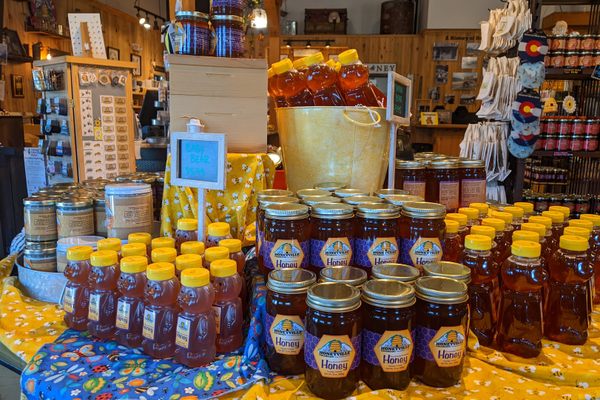AO Edited
Pinkerton Hot Springs
A multicolored mineral mound dribbles piping hot spring water right off the side of a highway.
The southwestern part of Colorado is well-known for its hot springs. Pagosa Springs, Durango, and Ouray all feature luxurious pools, heated by Mother Earth herself. While you can expect to pay a non-trivial fee to soak in these pools, there is at least one free option available. Just off Highway 550, behind a colorful rock mound, lies a small hot spring pool, infused with a variety of minerals.
As surface water seeps into the ground, it is heated by geologic forces—either a magma plume or the sheer pressure of the earth’s crust. This heated water breaks down minerals and brings them up to the surface, where they build up and calcify. The elements that dominate the spring water include calcium, magnesium, sodium, and potassium. The orange color that makes up the bulk of the mound comes from iron oxides and hydroxides. Mineral stains of red, green, yellow, and black also contribute to the unique beauty of this formation, making it a vibrant spectacle.
In 1875, a man named James Harvey Pinkerton settled in the Animas Valley with his wife and children. In addition to his career as a judge for La Plata County, he also set up a ranch that happened to have a glorious natural hot spring. The Pinkertons set up a bathhouse alongside their profitable dairy ranching operation. Later, in the 1890s, the hot spring’s water was bottled and marketed as a healing remedy.
Nowadays, the main site of the ranch is occupied by the Colorado Timberline Academy, while the hot springs are public property. Beside the mineral mound is a sign explaining the history of the springs, as well as twin signs admonishing visitors not to climb on it. This is partially to protect the geology of the formation, but even more so to avoid injury. The surface of the rock is smooth and slick with both water and algae, and even a short fall could result in broken bones. No healing waters will save you from that.
Know Before You Go
There is a substantial dirt parking area just south of the springs, with far more capacity than the small pool could ever hold. If there are other visitors, remember to be respectful. And as always, remember to leave no trace. Also, keep in mind that hot springs, like any other natural water features, play host to bacteria and other microorganisms. It is best not to drink from them.



















Follow us on Twitter to get the latest on the world's hidden wonders.
Like us on Facebook to get the latest on the world's hidden wonders.
Follow us on Twitter Like us on Facebook